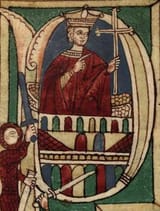Search Results
6/26/2025, 5:06:32 PM
>>508789972
Sorry but Reconquista is very well documented. Ask any Spaniard.
Picrel: King Pelagius at the Battle of Covadonga
>Pelagius (Spanish: Pelayo;[1] c.685 – 737) was a nobleman who founded the Kingdom of Asturias in 718.[2] Pelagius is credited with initiating the Reconquista, the Christian reconquest of the Iberian Peninsula from the Moors, and establishing the Asturian monarchy, making him the forefather of all the future Iberian monarchies, including the Kings of Castile, the Kings of León, and the Kings of Portugal.
>Pelagius was born around 685, although the exact details of his early life remain largely unknown. Traditionally, Pelagius was depicted as of Visigothic origin.[3] Recent scholarship increasingly supports that Pelagius was a nobleman of Hispano-Roman descent, linked to the local Asturian elite.[4][5][6][7] Historical texts emphasize Pelayo's connection to the local Asturian society.
>Pelagius was buried in the church of Santa Eulalia de Abamia, located in the surroundings of the village of Corao, near Cangas de Onís.
Now tell me more about the Pagan reconquista so that we can laugh at you even more.
The peasants having stupid folk belief was nothing unusual, even the Finnish priests complained about that still in the 1800's. The Visigoths were already Christian long before they even settled Spain.
Sorry but Reconquista is very well documented. Ask any Spaniard.
Picrel: King Pelagius at the Battle of Covadonga
>Pelagius (Spanish: Pelayo;[1] c.685 – 737) was a nobleman who founded the Kingdom of Asturias in 718.[2] Pelagius is credited with initiating the Reconquista, the Christian reconquest of the Iberian Peninsula from the Moors, and establishing the Asturian monarchy, making him the forefather of all the future Iberian monarchies, including the Kings of Castile, the Kings of León, and the Kings of Portugal.
>Pelagius was born around 685, although the exact details of his early life remain largely unknown. Traditionally, Pelagius was depicted as of Visigothic origin.[3] Recent scholarship increasingly supports that Pelagius was a nobleman of Hispano-Roman descent, linked to the local Asturian elite.[4][5][6][7] Historical texts emphasize Pelayo's connection to the local Asturian society.
>Pelagius was buried in the church of Santa Eulalia de Abamia, located in the surroundings of the village of Corao, near Cangas de Onís.
Now tell me more about the Pagan reconquista so that we can laugh at you even more.
The peasants having stupid folk belief was nothing unusual, even the Finnish priests complained about that still in the 1800's. The Visigoths were already Christian long before they even settled Spain.
Page 1
